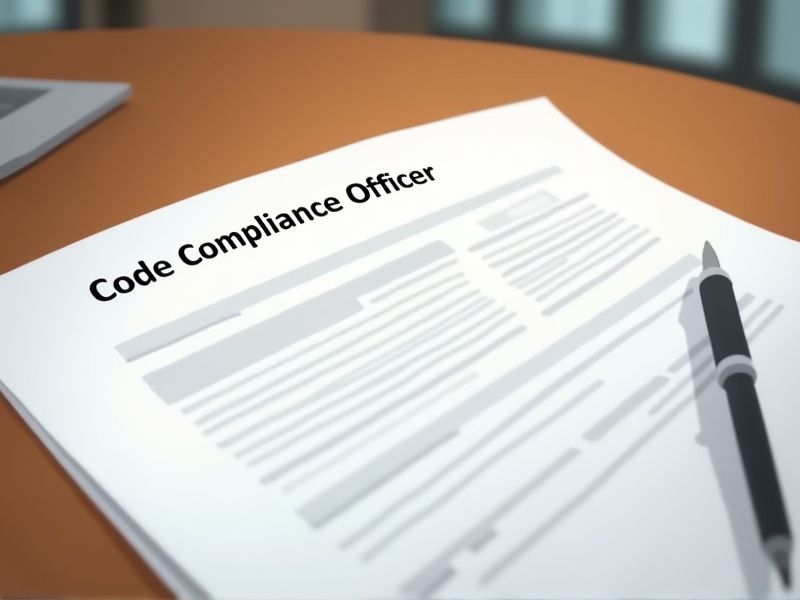
Code Compliance Officers ensure that properties and buildings adhere to local, state, and federal regulations, safeguarding public safety and community standards. Certifications equip them with specialized knowledge and skills in building codes, zoning laws, and safety regulations. These credentials validate their expertise, ensuring consistent, informed decision-making and enforcement. Here are some essential certifications you may require as a Code Compliance Officer.
International Code Council (ICC) Certified Building Inspector
The ICC Certified Building Inspector provides expertise in understanding and applying building codes, which directly ensures safety and regulatory compliance. This certification ensures Code Compliance Officers have a standardized knowledge base, reducing errors and non-compliance issues in construction projects. Reliable inspections by certified professionals can decrease future liability and repair costs associated with code violations. Municipalities and construction firms often require this certification, as it boosts public trust and ensures adherence to evolving building standards.
International Code Council (ICC) Certified Code Enforcement Officer
An ICC Certified Code Enforcement Officer ensures that construction projects adhere to local, state, and national codes, reducing the risk of structural failures and enhancing public safety. Their certification equips them with up-to-date knowledge of relevant codes and regulations, facilitating consistent enforcement. Their expertise mitigates potential legal liabilities for municipalities by ensuring compliance with established building standards. Communities benefit from their role as they help maintain property values and improve overall neighborhood quality.
International Code Council (ICC) Certified Residential Building Inspector
The ICC Certified Residential Building Inspector possesses specialized knowledge in residential building codes essential for maintaining construction safety standards. Their certification ensures that inspections are thorough, reducing the risk of future structural failures. With expertise in code interpretation, they provide critical support in navigating and enforcing complex regulations. Employing someone with this certification enhances confidence among stakeholders by demonstrating commitment to upholding industry standards.
International Code Council (ICC) Certified Fire Inspector
An ICC Certified Fire Inspector ensures that fire safety regulations are consistently enforced, reducing the risk of fire-related incidents. Expertise granted by certification allows for efficient identification and resolution of code violations, promoting safer community environments. Certification ensures that inspectors are up-to-date with the latest fire safety standards and can effectively communicate these to builders and developers. Their role is crucial in maintaining public safety, as they are trained to assess potential hazards and enforce compliance effectively.
International Code Council (ICC) Certified Electrical Inspector
The ICC Certified Electrical Inspector ensures adherence to electrical codes and standards, reducing risks of electrical failures. Their expertise in code compliance promotes safety in construction projects, mitigating potential hazards. A certified inspector brings credibility and ensures projects meet legal and technical specifications. Their involvement in inspections enhances community trust and maintains the integrity of public infrastructure.
National Association of Certified Home Inspectors (NACHI) Certification
NACHI certification ensures that a Code Compliance Officer has a standardized understanding of construction and safety protocols, which is crucial for enforcing building codes. This certification provides detailed insights into the intricacies of residential building systems, enhancing the officer's ability to identify potential issues. By certifying through NACHI, officers receive ongoing education, keeping them informed about evolving standards and technologies in the field. As building regulations become more complex, having NACHI certification supports credibility and professionalism, reassuring communities that inspections meet high standards.
OSHA 30-Hour Construction Safety Certification
The OSHA 30-Hour Construction Safety Certification equips a Code Compliance Officer with in-depth knowledge of workplace safety standards, promoting the enforcement of regulations effectively. This certification enhances the officer's ability to identify potential hazards on construction sites, directly impacting their capability to prevent accidents and injuries. Understanding OSHA guidelines enables the officer to communicate safety protocols clearly, leading to improved compliance across job sites. Certification fosters a culture of safety, which statistically correlates with a reduction in workplace incidents and legal liabilities for construction companies.
LEED Accredited Professional (LEED AP)
A LEED Accredited Professional (LEED AP) provides a thorough understanding of sustainable building practices, directly impacting the effectiveness of code compliance in terms of environmental standards. Comprehensive knowledge of LEED frameworks ensures that a Code Compliance Officer can accurately assess projects for adherence to green building codes. With their expertise, code compliance officers can facilitate reviews and approvals for projects aiming to achieve LEED certification. Incorporating LEED principles into compliance processes can lead to more energy-efficient and environmentally responsible community development.
Certified Construction Manager (CCM)
The role of a Certified Construction Manager (CCM) often intersects with that of a Code Compliance Officer, as both prioritize adherence to regulatory standards and look to minimize construction project risks. Having a CCM ensures thorough understanding and implementation of necessary codes, leading to fewer compliance issues during construction. Their expertise in managing complex projects reduces the likelihood of violations and enhances overall project efficiency. The CCM's ability to apply strategic oversight and quality assurance aligns with the compliance officer's goal of maintaining public safety and structural integrity.
Construction Specifications Institute (CSI) Certified Construction Contract Administrator
The CSI Certified Construction Contract Administrator ensures that construction projects adhere to relevant codes and standards, mitigating potential legal and safety issues. Proper understanding of contract administration by certified professionals can streamline communication between project stakeholders and code compliance officers, reducing errors. This certification signifies a comprehensive grasp of regulatory frameworks which supports code compliance officers in identifying deviations from established guidelines. With their expertise, projects are more likely to meet timing and quality benchmarks, thus supporting efficient regulatory inspections.
Summary
When you acquire certifications as a Code Compliance Officer, your credibility and professional standing increase significantly. These credentials often lead to improved job prospects and the potential for higher salaries. You become more adept at understanding and enforcing regulations, reducing the likelihood of compliance violations. Stakeholders and communities benefit from enhanced trust and assurance in your authoritative capabilities.
